#it’s an episode with three subplots and
Text
Thinking about what a roller coaster of a year 1867 was for the Wittelsbach-Habsburg family: in January Helene and Mathilde had children and Sophie became engaged to Ludwig II, in March Sophie of Saxony died, in June was the Hungarian coronation and both Emperor Max and Maximilian of Thurn und Taxis died, Elisabeth became pregnant with Valerie at some point in July, in October Ludwig II ended the engagement... they just couldn't take a break
#i was thinking about the series that exist in my head and what a mess to adapt this year is#it needs at least three episodes if only to space out the deaths#also if we look at the extended family queen maria theresa of the two sicilies died in august 1867#which is kinda important for the marie sophie subplot so it should also be in the show#season 2 of my epic show needs like twelve episodes lol
7 notes
·
View notes
Text
i rewatched the first season of hannibal and my main issue is that they never show any of will or hannibal's feelings towards abigail, they keep saying that they feel like her fathers but you never actually get that feeling
#she's my least favorite subplot in the first season but i think it could be fixed with more scenes of her#or better writing in her existing scenes#episode three focuses on her but the pacing is wack and it doesn't do characterization very well#hannibal
4 notes
·
View notes
Text
Invited to the White House!
Okay, not really, but I did receive an invitation to the White House, which is as close as I'm probably ever going to get. :D
I believe I have regaled you in the past with my stories of the Honorable Colleen Davis, treasurer of the state of Delaware, who I am sure does a good job with numbers but definitely does not know her own email address. For SEVENTEEN YEARS now I have been getting misdirected email for this woman, and nothing I have ever done, no way I have tried to reach out, none of it has ever changed things.
Anyway, today I got this in my email:

I assumed that it was definitely some sort of mass email designed to get me donating money (as you can see, Cory Booker is a frequent correspondent of mine,) but I opened it up anyway just for laughs. There is no way I would ever get an invitation to the White House for anything except maybe to receive the Award for Excellence in West Wing Fanfiction, but a girl can dream!
Turns out it was a real legit invite, just not for me!

Now over the years I have been tempted many times to use my power of misdirected emails for my own entertainment. After all, if one has a dumb superpower, all one can really do is have fun with it, right? NEVER have I been more tempted to RSVP on someone else's behalf just to cause a bit of minor chaos. I mean think about it, I could theoretically invite myself as a guest just by clicking a link. It would be very funny before I got arrested!
But no, I am better than that, and also I am much further away from the White House than I used to be and being in jail would complicate my holiday plans. The problem is, I have never, in all these years, figured out a good email address for Colleen Davis, because any time I have tried to get in touch with her or forward mail to her, she has never responded. I've tried Facebook, tried her official website, tried spitballing email addresses close to my own to see if they'd work. Nothing. But I had to try, right? Here's today's effort:

I was trying to be a good person, but I am also sarcastic and difficult by nature, plus this has been going on, I remind you, for SEVENTEEN YEARS. Anyway, no answer yet, but hopefully she or somebody in her office will see that and maybe she'll get to go to her party after all. I hear the White House is very pretty at Christmas.
#white house#president biden#colleen davis#i get mistakenly invited to all the best parties#honestly this feels like it could be a subplot to a west wing episode#if they were made in the 2020s instead of the 2000s#meant to invite some minor government functionary to the white house#sarcastic housewife who once spent three hours in the white house visitors center to get details for fiction writing shows up instead
12 notes
·
View notes
Text
.
#just listened to sons and sonsability episode 1 and i'm dying#if you like regency and dnd and improv comedy i so recommend it#ep 1 is free on spotify and you can buy all three episodes for $7.50#i'm ^_^ sad so i'm going to be spending some money impulsively ^_^#to be clear i am fully recommending it for??? a murder subplot
2 notes
·
View notes
Text
Types of AO3 Summary
Option 1 - The Excerpt:
The quickest, the easiest! Find a section of your fic that contains the main premise of said fic and also showcases your writing. Copy paste that into the summary box. BOOM! Done.
Best used for any fic, unless it's so short the excerpt would be the whole fic.
Option 2 - The No Frills:
Just a description of the fic. No need for drama. No need to complicate matters. Keep it simple, keep it safe.
Example:
"A short character exploration of Blorbo's thoughts after Daisy leaves."
Best used for short fics, poems and fics where the style/format is more important than the plot. Or fics that tie directly into a scene/episode from canon or another fanfic.
Option 3 - The Hook:
Draw the reader's interest by giving them a set up with no conclusion. Introduce the main character(s), introduce the status quo, describe an inciting incident, leave a question in the reader's mind.
Example:
"Blorbo is a barista at a coffee shop, struggling to pay their bills, but after handsome rockstar Obrolb walks into their coffee shop they find that they have to decide whether a chance at love is worth the cost of fame."
Best used for mid to long fic where there's a strong premise and follow through. Especially good for AUs. Can be expanded for more complex plots or used multiple times in one summary for multiple characters or subplots.
Option 4 - The Sitcom One-Liner:
"The one in which [over simplified description of one of the main plotlines]" This is essentially 'boil your plot down to the very simplest statement you can, oversimplify if possible. The more bizarre or unhelpful the better.
Example:
"The one in which Blorbo learns to like cake".
Best used for fics with at least a little humour in them.
Option 5 - The Rule of Three:
Three is a magic number. Find three key moments in your fic and just list them. That's it. Often ends with 'not necessarily in that order' if used for comic effect. If it's an AU, establish that quickly (i.e. 'Star NHL player Blorbo…').
Example:
"Blorbo makes a friend, falls in love, and almost burns to death, not necessarily in that order."
Best used for anything, really. Three is a magic number. The human brain loves things that come in threes.
Option 6 - The Trope Lure:
Why bother describing the plot? We all know AO3 readers are here for the tropes. Similar to The Sitcom One-Liner just using tropes instead of plot. Often followed by the phrase 'that nobody asked for'.
Example:
"The Space western / A/B/O / Mail Order Bride fic that nobody asked for."
Often tacked on to the end of The Hook or The Excerpt as a tl;dr.
Best used for fic that plays its tropes straight with no shame or second guessing.
Option 7 - The Pre-emptive Strike:
(Not recommended) You just wrote this fic, the self doubt is consuming you. You feel the need to apologise profusely for your existence for no apparently reason. You feel cringe, you think the fic is cringe, you want everyone to know that you think the fic is cringe in case they don't like it and judge you for it.
Example:
"So I fell in love with this pairing and had to write this. It's weird and terrible. Lol! I suck at summaries! Sorry!"
Best used for no fics ever. I cannot stress this enough.
(Seriously, I am begging you, don't do this. If you're planning to use this option, rethink it and do one of the others. I guarantee you more people will want to read your fic.)
Sometimes added on to any other summary as a strange disclaimer. (srsly. don't.)
Option 8 - The Unapology:
Embrace the mayhem, embrace the deep dark depths of your soul. The opposite of The Pre-emptive Strike. A combination of The No Frills and The Trope Lure that truly gives no fucks.
You have committed crimes and you are proud of them. You know what your USP is and you're going to make sure your target market finds you. Look upon my works, ye readers, and despair!
Example:
"There aren't enough tentacle fics in this pairing, so I had to write one myself!"
Best used for fics with controversial/polarising tropes with all relevant details already clearly stated in the tags.
Option 9 - The Interrogation:
What if you wrote a summary entirely in questions? What if your readers had to read the fic to discover the answers? Who knows what will happen if you do this?
Example:
"What happens when Blorbo McBlorbo gets his wish and Daisy doesn't make it to the plane on time? What happens when Obrolb finds out? How will this change Daisy and Blorbo's friendship?"
Best used for... I honestly don't know. This style of summary does not vibe with me. Mystery fic maybe? Sorry guys.
Option 10 - The Multipack:
Got a bunch of shorter fics in one work? No way of summarising them all without a wall of text larger than the Great Wall of China? This one is similar to The No Frills in that you're not describing the plots themselves and similar to The Trope Lure in that often broader genres and tropes are mentioned. What links those fics? Are they all in the same fandom? The same pairing? The same challenge? Just slap that right in the summary. A chapter list with 1-2 word trope/pairing summaries can be included or not.
Example:
"A collection of Blorbo/Daisy/Obrolb fics based on Tumblr prompts.
Chapter 1: Regency AU
Chapter 2: Werewolves vs vampires
Chapter 3: Ghost!Daisy
Chapter 4: Space pirates!"
Best used for (obviously) works that are compilations of fic.
Option ? - The Void:
I said The Excerpt was the quickest and easiest summary to do. I lied, well... I didn't exactly lie. What is quicker and easier than not having a summary at all? After all, that's what the tags are for.
Example:
Best used for... nothing? Write a summary, guys. Please?
#AO3#fandom#on writing#clearing out my drafts#long post#Qd#This list is intended for entertainment purposes only#I just came across a lot of fic summaries that followed similar rules#so I decided to post this about it#I'm sure other options are available#If you've ever used number 7 that's not bad of you#But my advice would be to not do that
10K notes
·
View notes
Text
Rank And Responsibility. Or: The Hairpin Scene from Jinshi's POV.
Be warned now about the consequences of choosing to do an English Lit degree - you end up doing lit crit for fun. With that in mind, let's break down the hairpin scene at the end of Covert Operations (Episode 5). Mild spoilers for Jinshi's arc are below.
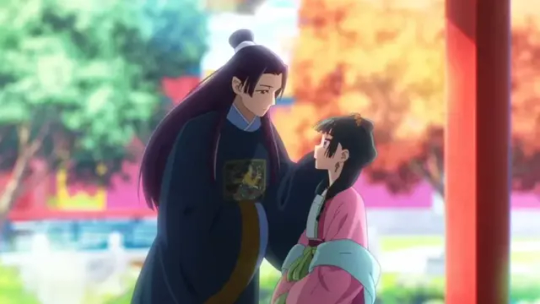
While this moment does kick off the romantic subplot, with all the implications that giving Maomao the hairpin out of his own hair has, I would argue that this is not the moment Jinshi realizes he's in love with Maomao. Instead, from his point of view, this scene demonstrates how Jinshi handles failure.
Holding Power In An Open Palm
This is still very early in the story. Our first hint to Jinshi's true rank does come in this scene, but for now we know him as the manager of the Rear Palace. For the three thousand people who live and work there, for all intents and purposes, Jinshi is the highest authority they will encounter. He literally has the power of life and death over them, either directly in the case of the servants and eunuchs, or in the case of the consorts, his word to the Emperor directly can serve the same purpose. We also see Jinshi use this power early on - he's not just there to keep order, but also to test the consorts' loyalties and virtue. We never see what happens to the lower-ranked consort who attempted to invite Jinshi back to her room, but at the very least that report ensures that her already small chance of the Emperor choosing her as a potential mother of the nation is utterly cut off - and if she doesn't bear children, she will be discarded.
We also know that Jinshi will not hesitate to order corporal punishment if he views it necessary - for example, when Maomao discovers that the toxic face powder is still being used by Consort Lihua's ladies in waiting, she mentions in the aftermath that the eunuch who failed to recover the powder was flogged, while the lady in waiting who hid the powder is put in solitary confinement. These are brutal punishments - and if we consider the historical inspirations, these are also very restrained consequences. For hiding an item that caused the death of the prince (unfortunately, the more valuable child) and has put the life of one of the Emperor's favored High Consorts in danger, Jinshi would be utterly within his rights to order executions. If ignorance is a sin, ignorance in the face of knowledge is a greater one.
Microcosm of Li
For all that Jinshi holds his power lightly, he also takes the responsibility that power bestows upon him quite seriously. It's worth noting that Jinshi takes over governing the Rear Palace shortly after Maomao's service contract is purchased. (Remember, Xiaolan talks about the "beautiful, new eunuch that's been posted to the central courtyard," which tells us that Jinshi has not been in the Rear Palace long enough to become a fixture - he's an object of speculation and admiration from episode 1).
In context it's clear that, with the birth of two Imperial children, his job is to ensure the survival of the Imperial line and investigate why children of the Emperor are dying consistently in one of the wealthiest and safest places in the entire empire. We're shown him running in between Lady Lihua and Lady Gyokuyou to ensure that their very sick children are being seen to properly, investigating what could be causing it, while also managing tensions as rumors about the Emperor's children being cursed begin to spread and outright accusations of sorcery are being thrown between consorts. While the audience might immediately scoff along with Maomao at the idea of one consort cursing another, if Maomao hadn't found the cause of death, those types of accusations followed by Lady Lihua's and Princess Lingli's inevitable deaths could have ended with Lady Gyokuyou's execution.
The Rear Palace is a reflection of the nation as a whole. No Imperial heirs plus the deaths of two High Consorts with various foreign and domestic political ties had the potential to thrust the entire nation into chaos. Jinshi's choices have very real consequences, so when Maomao discovers what the true cause of death is and sends her warning, Jinshi looks at Maomao and doesn't see a person. He sees a "perfect pawn." A tool, one with talents that have ensured that at least one Imperial child has survived and providing a rational explanation why these children have died so that it can be prevented from happening again - and a skill set that can be turned to preventing any more shenanigans in the Rear Palace that could threaten the empire's foundation.
And, as Gaoshun points out, in the beginning of the hairpin scene, she is a toy. Maomao amuses Jinshi up until this point.
For all that Jinshi is shown wielding power with a light hand and a responsible mindset, it literally doesn't occur to him that the people working in the rear palace have stories - some tragic - about how they came to be there. They are resources to be used as befits the Emperor's (and therefore the nation's) need.
Hidden Beauty
When Maomao turns around and Jinshi doesn't recognize her until she speaks, he's shocked. He thought he knew exactly who and what this girl was - ugly and unremarkable, except for her intellectual brilliance and the challenge in managing her by other means than empty compliments and smiles. He attempts to recover and assumes that she is enhancing her looks - and is shocked again when he realizes that the face Maomao has presented to him so far is a protective mask against attracting attention. In a world where beauty is both a currency and a tool that others covet, Jinshi doesn't understand why Maomao would deliberately devalue herself like that. So she tells him.
This is the moment Maomao becomes a person to Jinshi.
Not a toy, not a pawn. Someone who has been ripped from her home and her life illegally and sold off. It's in this moment that Jinshi is forced to confront the ugly side of the society he lives in, people who would rape Maomao out of pure convenience or just take a "borderline marketable" girl off the street in order to get extra drinking money.
Worse, Jinshi is complicit in Maomao's captivity. The Rear Palace has bought her contract - and as the manager of the Rear Palace, Jinshi is responsible for everything that happens within its' walls. The fact that Jinshi does not personally oversee service contracts is irrelevant. The buck stops with him. If the Matron of the Serving Women or whoever is below her is buying these contracts without checking their sources, that is Jinshi's fault because he has allowed a lax enough system to flourish. He has failed to govern this microcosm of the nation wisely, with thought for the welfare of the least powerful among his people. Worse, he has failed to even notice the problem - Maomao may say she's angry about having been kidnapped and sold, but she doesn't react in a way that indicates anger. Instead, she's resigned. Yes, what happened to her was wrong and she's angry about it, but there's literally nothing she or Jinshi can do.
Or Is There?
Jinshi offers Maomao two apologies, the first of which is our first hint to his true status. "I'm sorry we couldn't police them better." Maomao immediately blows off this apology - she points out that there's no way Jinshi should have known and has a very "all's well that ends well" attitude about her situation - her contract will be up eventually and in the meantime she's managed to land in a fulfilling role. Essentially Maomao is telling Jinshi that this apology is not his to make - he's overstepping his responsibility. And, if Jinshi were simply the manager of the Rear Palace, she would be right. It's his job to ensure that the Rear Palace is properly staffed, not to regulate that all contracts comply with the law.
Jinshi apologizes again. This time, he offers no other context. He doesn't accept Maomao's absolution of responsibility - because he knows (even if we, the audience, don't) otherwise. It can certainly be read as Jinshi refusing to accept easy absolution, and the rest of those witnessing the scene, apart from Gaoshun, certainly take it that way.
Instead, he takes the hair stick from his own hair and places it in Maomao's. Their entire relationship has just been upended; Maomao is a person who has been gravely wronged and it is Jinshi's responsibility to begin to make it right. Aside from the personal implications of giving her the hairpin (and the faint blush on his face makes it clear that he's aware of them), it is a form of restitution. There is an unspoken social contract Jinshi is offering that Maomao does not understand in the slightest. It never occurs to her that Jinshi would do something for her with no thought of what he would receive in return, because of the difference in their social ranks. But, from Jinshi's perspective, that social difference is the point. He has failed her and, as the person of higher rank, it is his responsibility to do what is within his power to begin to remedy the situation in front of him.
And, of course, in that moment he sees Maomao in a new light, the other meaning of gifting her his hairpin has fertile ground to take root in Jinshi's mind.
#the apothecary diaries#kusuriya no hitorigoto#jinshi#maomao#jinmao#long text post#apothecary diaries meta#kusuriya anime#knh#jinshi x maomao#jinshi and maomao#lady gyokuyou#lady lihua#princess lingli#gaoshun#hair pin#episode 5#covert operations
461 notes
·
View notes
Text
Reactions to From Unknown Graves really show the two camps of “people who get it” and “people who are incredibly uncomfortable when things are not right there on the surface/black and white morality/spoonfed to them” and it’s a little disheartening.
#and this goes to the what#three main plots of that episode minus the other subplots?#you know like#'yeah it's ALL FUCKED UP and THAT'S THE POINT'#and the aliens#and the Claire/Isaac stuff I'm so annoyed at everything#sorry half the fandom you're cool#this other half though#I'm going to die on the hill that 3x07 has been the best episode of the season so far
0 notes
Text
No Such Thing As Filler
Okay, so yes, this is another post based on something I saw that irritated me, but it seems like this idea keeps coming up, so I need y'all to internalize this. There is no such thing as filler in good writing. None. Do not approach your work thinking you have to fill space in a story, I will beat you with this wiffle bat. Don't ask me where I got the wiffle bat. Don't even worry about it.
The idea of filler comes from a very particular place - when an anime or TV show has to fit in a certain number of episodes, but doesn't have enough content (hasn't caught up with the manga, the source material isn't long enough, etc) to cover those episodes. An episode has to be written, but the characters can't really progress, and so are given something else to do. Many a trope has come from these episodes, and they're sometimes necessary. Filler in this context is something that makes sense.
The dark side of filler is the idea that you need some space between Big Event 1 and Big Event 2 in your story, therefore you need throw anything in there to take up space and make your word count. This is a mistake I've made and I've seen plenty of other writers do it too, but it's a huge waste of your time. You do need something between those big action scenes, but you should always be writing to accomplish something.
Instead of thinking of that writing as filler, try to approach it with three things in mind:
Move Forward With Character Development and Backstory - Your characters barely survived a huge gunfight, and they won't encounter the big bad again for another few chapters. How do your characters decompress from that gunfight, and what does that say about them? Did a cocky character go in guns blazing, only to be deeply shaken by how a real fight works? Did that fight spark a moment of deep trauma for the main character that they have to reflect on afterwards?
Filling this space with meaningless scenes is a huge waste of opportunity. Think about how to dive deeper into your characters.
Move Forward With Plot and Subplot Development - The bad guy beat the heroes to the stolen gem, but they left behind a clue to why they want it. However that clue could reveal some painful truths about the protagonist's beloved great aunt... Carmen Sandiego???
A major goal following a big action scene is having the characters figure out what to do with what they've learned and what to do next. It's where romance subplots or secret relative subplots make progress, when truths are revealed and next steps are taken. You can absolutely do this in any setting - a flirty conversation while at the battling cages, a tense moment of feelings while hunting down a wayward chicken - but your main goal is making progress for both the characters and plot.
Move Forward With Worldbuilding - Worldbuilding has it challenges, believe me. You don't want to write a chapter on how an airship works only to have to cut it later. But you should still try to flesh out your world, and you should do so with the perspective of how to use that worldbuilding to your benefit. Maybe a critical scene hinges on the main characters knowing how that airship works, or that lake your main character often stares at is the setting of the big Act 3 Boat Battle. The weather can play into both perspective and emotions. Knowing what the main character's house and car looks like can reflect a lot on their personal character or backstory.
When you're struggling with a scene or a chapter, rather than writing filler, take a few steps back and think. What can you establish with your worldbuilding? What can you reveal about your characters through their dialogue and actions? What subplot could you explore or add in these between moments?
Filler from a fandom perspective - Now let me make this clear - if you're writing a fanfic just to have a cute moment between the characters you like, or you really want to force everyone to do that weird Twilight baseball scene, that's fine. You don't need a grand goal to achieve for every story, there's no need to justify your fanwork in any way other than you wanted to do it.
But I'd also argue fanwork doesn't fall under the filler label either - something you create, be it a character snapshot or a 'what if the gang meets Slenderman' parody, isn't taking up meaningless space. It's something fun you did that you and others enjoy, and there's nothing wasteful or pointless about that.
#writing advice#plotting#filler#writblr#the wiffle bat is a metaphor#for uuuuh something that sounds cool and interesting#let's go with that
313 notes
·
View notes
Text
Welcome to another round of W2 Tells You What You Should See, where W2 (me) tries to sell you (you) on something you should be watching. Today's choice: 琅琊榜/Nirvana in Fire.
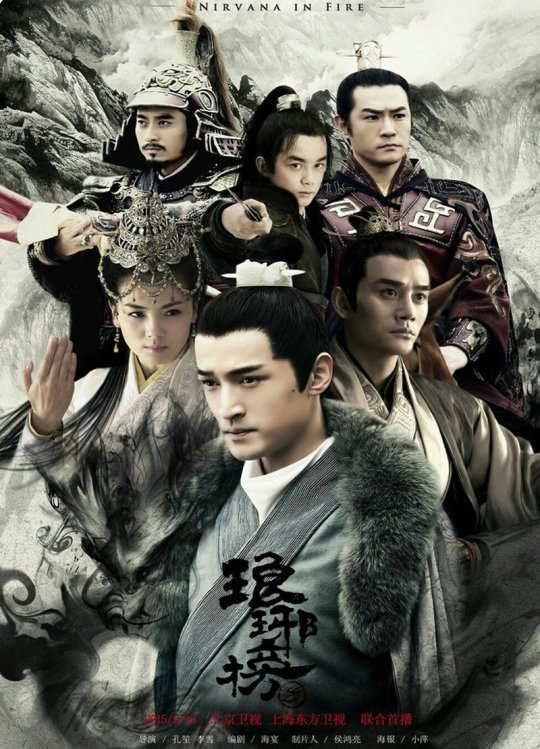
Nirvana in Fire is a 2015 historical series best described as either a complicated succession drama set in the premodern Chinese imperial palace, or the story of a man who didn't die a decade ago and has decided to make it everyone else's problem.
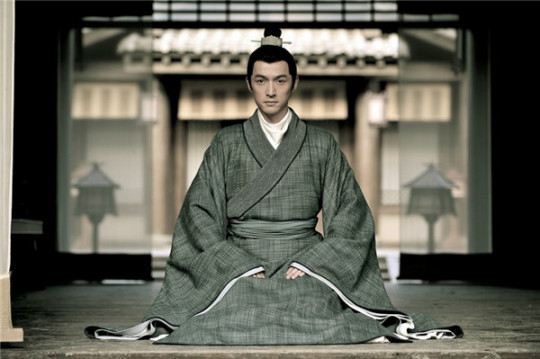
And really, I almost feel silly giving my glib little summary, because Nirvana in Fire is so well-known of a property. It's a classic for a reason, and that reason is that it's legitimately very good. This show is what happens when you adapt a solid story, get a bunch of very talented actors, and throw a huge amount of money at it. It's incredibly popular and highly acclaimed, and it earned all of the hype.
Still, while I bet there are few people adjacent to c-drama stuff who've never heard of Nirvana in Fire, I'm sure there are plenty who haven't watched it. After all, it looks like one of those slow, serious shows with a lot of ponderous talking and no joy. If that's the impression you've been given, I could imagine looking at the 54-episode commitment and saying, I don't need that in my life.

I am here to tell you you're wrong. It is a banger of a show. It's tense. It's funny. It's heartbreaking. It’s exceptionally clever. It’s jaw-droppingly stupid. It’s romantic. It’s tragic. It has smart plots and bizarre subplots. And that's not even touching the thing with the yeti.
So in case you're one of those people who's heard of Nirvana in Fire, but has put off watching it for one reason or another, I'm here with five reasons I think you should try it.
1. Epic Shit
Did you like the Lord of the Rings? More specifically, did you really like the second Peter Jackson film? Great, then you're all set for this.

I guess I could have called this Game of Thrones without the dragons, but that's not actually the vibe at all. Game of Thrones is much more sensational and salacious, with all the blood and butts and what-not. The Tolkien comparison is more apt, I think, because Nirvana in Fire is equally about as wholesome as you can get in a property where dudes are still getting stabbed all the time.
This is a show about vengeance. And yeah, justice for the fallen, sure, that's fine too. But mostly it's about a bunch of good people joining forces to make sure the bastards who did wrong pay, with their lives as necesary.
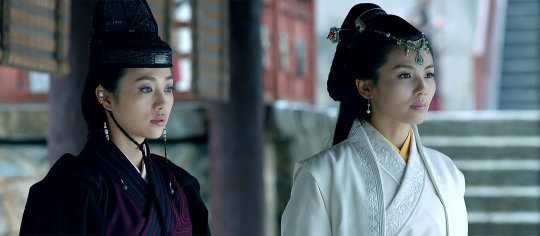
The problem, though, is that these bastards are incredibly powerful, which means that a pure brute-force approach isn't going to work. Accordingly, this quickly becomes a story about the power of smart teamwork to exact retribution on some people who can (and did!) legally get away with murder -- and our heroes are some of the people with their necks most on the line if anything goes wrong.
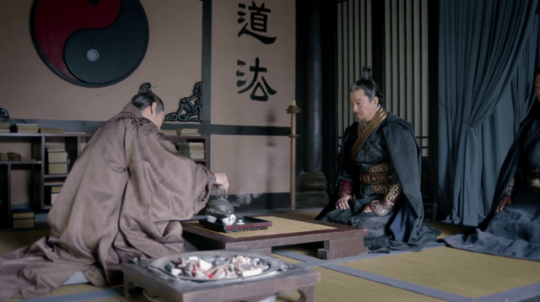
Don't let the Middle Earth comparison fool you into thinking this is all epic swordfights. It's not. (I mean, for one thing, as well-funded as this project is, it doesn't have Peter Jackson Money.) The vast majority of the tension in the show comes from dialogue and slow, terrible realizations. The fight scenes are almost a relief from the nail-biting intensity of intimate conversations about getting a letter from somebody's ex-wife or returning a book.
All told, the show has that incredible almost-RPG vibe of going through all the little subquests and cutscenes you find along the way to defeat the final boss. The plot carefully unravels a multi-tendriled mystery told to you by people in incredible costumes. It doesn't get much more epic than that.

(Nirvana in Fire is also a cautionary tale about how you should be very careful with who gets invited to your birthday party.)
2. A chronically ill protagonist
Okay, right in the first episode, it is established that the main character has three whole completely different names and an old nickname. I'm going to call him Mei Changsu for the duration of this rec post, but let the record show that I could just have easily gone with one of the other three.
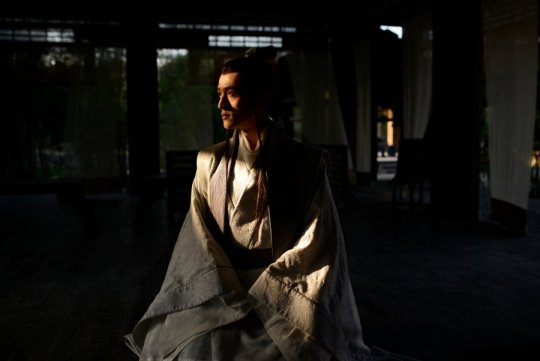
What you learn in that same first episode is that Mei Changsu used to be a palace insider, the cocky son of a noble family, only now nearly everyone he used to know thinks he's dead. Also, he's not far off from being actually dead -- he has an unspecified terminal condition that's mostly managed, provided he stays in his little mountain hideaway with his handsome doctor bestie and doesn't return to his old stomping ground and start kicking over hornets' nests.
So guess what he's about to do.
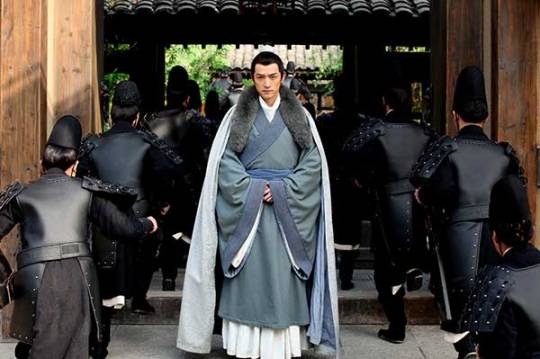
I have to make a note of how brilliant the casting is here: Hu Ge is an action actor! He is a kickpuncher of a man! And I think it's great that you can sort of see his frustration, as well as Mei Changsu's, at having to spend the whole series wrapped in countless layers of fabric and/or lying in bed while everyone around him gets to be the badass action heroes.
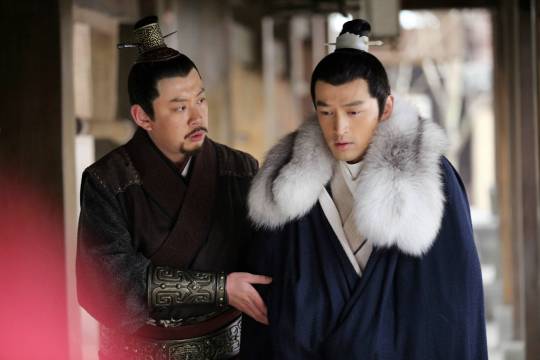
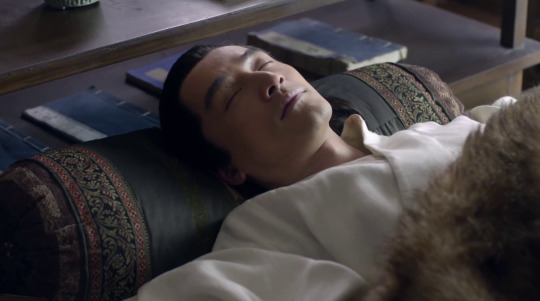
Mei Changsu's not faking it, either -- he's actually dying. He expends his energy where he thinks it's necessary, and sometimes that means he has to spend the following week in bed. He's constantly frustrated with himself for what he can't do anymore. He's racing a clock, and that clock is his own failing body. If he dies, the only hope anyone here has for justice dies with him.
He gets two love interests that the show treats pretty much equally. One's a lady general who wasn't even a love interest in the book. The other's the handsome prince who was initially going to be his textual romantic partner in same book, until the author hopped genres from danmei to general historical drama. I can't even call this a love triangle, because there's no competition. He just gets a wife and a husband -- in that he gets neither, because circumstances and his own illness keep him distant from them. He lies to both of then about his condition (among other things). He wants to be with them both and knows he can't be with either. And they in turn have to learn to accept what of him they can and can't have.
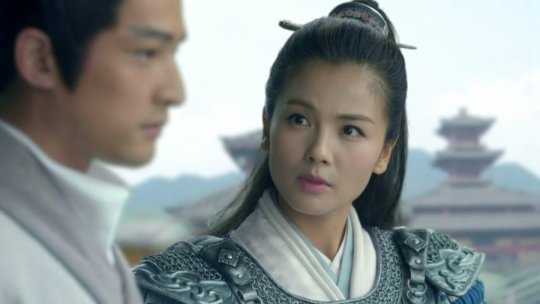

(Also, Nihuang (her) and Jingyan (him) are both incredibly gorgeous, which is exactly what bisexual genius Mei Changsu deserves.)
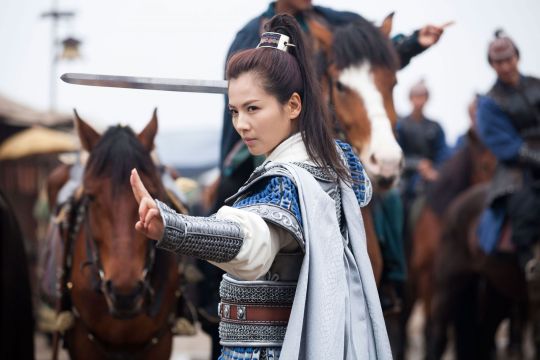
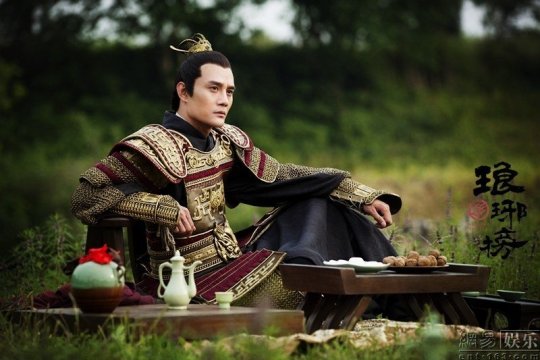
Obviously this isn't a perfect representation of life with chronic illness, largely because Mei Changsu is an incredily wealthy man who lives in a universe with what's basically magic medicine. However, I've seen the story's treatment of him and his condition resonate with a lot of chronically ill viewers, so even with the fantasy layer on it, there's definitely something there.
3. Dave
I have already told the story of how Meng Zhi became "Dave," but long story short, he's such a Dave that I legitimately forget his character's real name. He embodies Daveness. He's The Ultimate Dave.
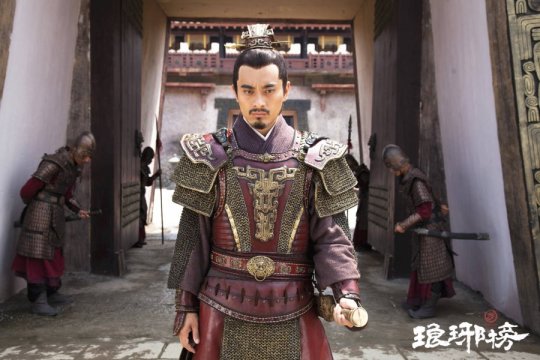
Dave is an excellent fighter, a loyal friend -- and a terrible liar. He's possbly the only straightforward character in the entire show. When he's asked to be duplicitous, he's comically bad at it. Dave will never do a heel turn. I was misled at first by his semi-evil facial hair, but I have seen the error of my ways. Dave is pure lawful good.
And the reason I list Dave as such a selling point is that having a Dave means you always know what's going on. This is because Dave never knows what's going on, and he has no ego about that, so he asks questions, and other characters have to explain to him what just happened, and that is how you figure out what's going on.
It's an incredibly smart move on the drama's part, because some of the (very fun) schemes are so complicated that there's no way for you, the viewer, to understand them just by watching. Without the internal monologues and omniscent narration of a book, the machinations are opaque. You need things explained -- but why would the schemers explain their schemes? Well, Dave needs some exposition, so here you go.
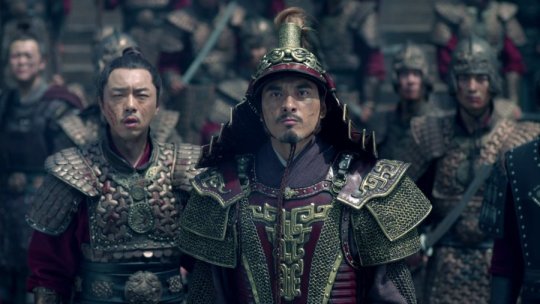
So if you're worried that you might be left feeling stupid by a show where so many sneaky people are hatching so many complex plans, worry not! Like the good man he is, Dave has your back.
4. A Million Amazing Antagonists
If you like bad guys, this is a show for you. This show has brilliant bad guys all the way down. It has bad guys at every turn. It has bad guys for every taste. Welcome to Big Liang's Big Bad Guy Emporium, where we guarantee you'll walk out of here with a bad guy you like, or your money back!
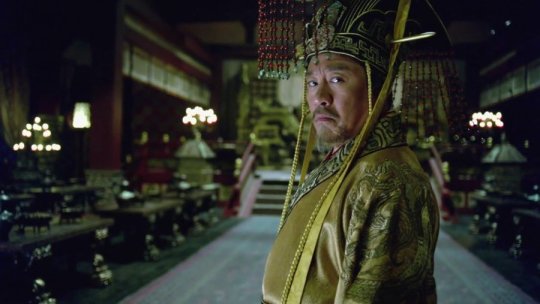
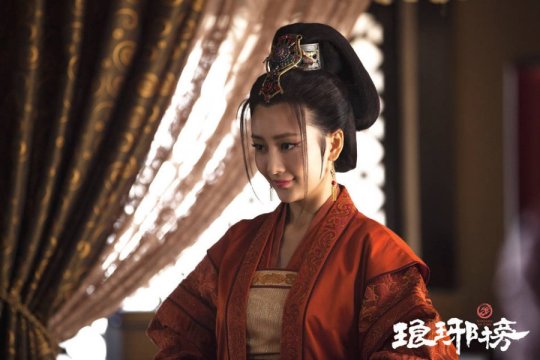

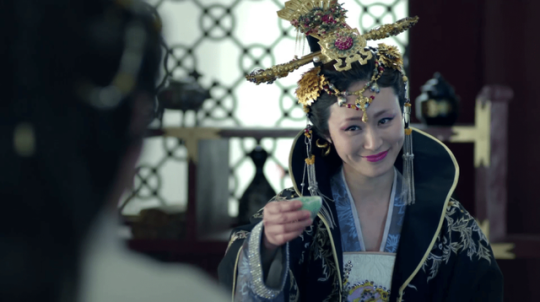
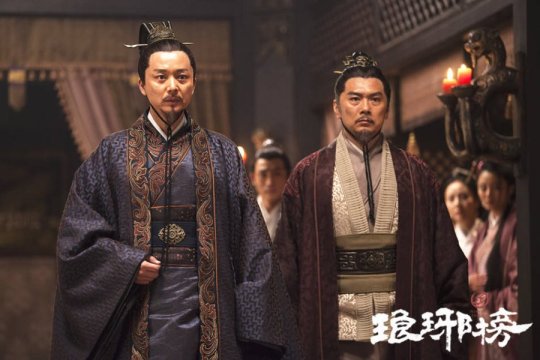
(And yes, this set of pictures is also to say that their costume budget was entirely well-spent.)
Without getting too far into spoilers, I will say that the basic situation underlying the whole series is this: The emperor has done a lot of bad things, and he has enlisted a bunch of people's help in hiding those bad things, so much so that many of those other people have done even more bad things the emperor didn't even know about -- and then everyone has gone to great lengths to cover those up as well. Our protagonists spend the whole series unraveling this colossal shitshow and bringing people to task for their crimes.
So really, if you're going to spend 54 episodes taking down the baddies, they've got to be baddies you love to see taken down. And these are -- in part because all of them have crystal-clear, rock-solid motivations for their actions. Nobody here is a moustache-twirling comic-book-villain baddie. They're all bad for reasons that are very understandable in their individual contexts. And not a single one of them is going to go down without a fight.
5. World's Best Mom
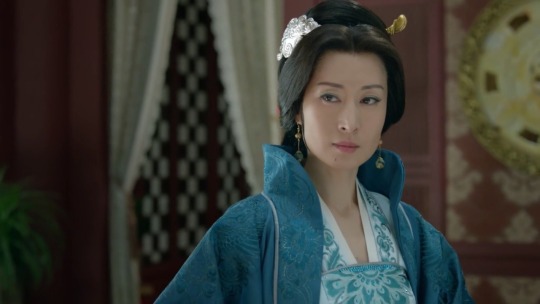
(Sidebar: The fact that four out of five of my reasons to watch the show are individual or groups of characters should be your strongest indicator that this is an intensely character-driven story.)
This is not a Dead Mom Show. Okay, some moms are dead, but mostly this is a Moms Are Alive And Often Cause Problems Show, which is a lot of what makes the palace drama so delicious. But there is one Good Mom who stands out above all the rest: Consort Jing.

Played with perfect grace and devastating politeness by the stunning Liu Mintao, Consort Jing is a skilled doctor and excellent baker who starts the show with a low-level status among the women of the palace. She swallows down all kinds of mistreatment because she's not in a place to oppose it -- and when she can retaliate, it must only be through soft power. She loves her jock son with all her heart, but because of both their relatively poor positions in the hierarchy, she doesn't get to see him all that much. She wants to be an asset to him, while all the time she has to fear becoming a liability.
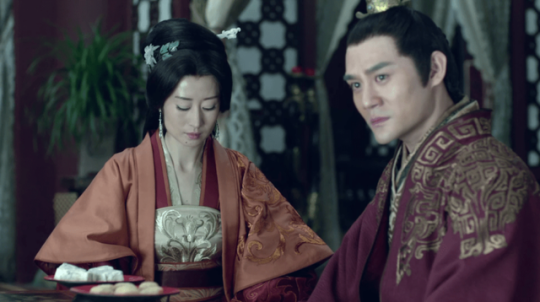
She is also the smartest person in any room that she's in, unless she's in a room with Mei Changsu, and even then it may be a tie.
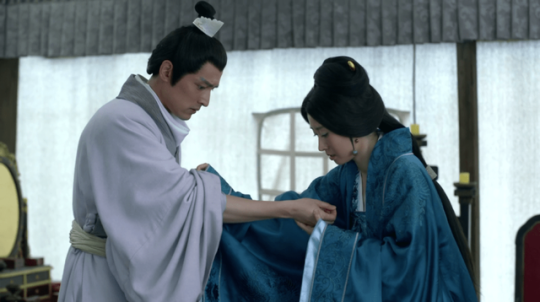
There are lots of great characters in the show that I could have highlighted here, and plenty of them are women, but Consort Jing in particular never ceases to impress me. She is trapped in a gilded cage, married to a man who [lengthy list of spoilers that are traumatic to her in particular], and held hostage by how every time she even looks like she's out of line, it puts both her and her boy in danger. She's the most vulnerable of any of our good guys. Kind of like Wang Zhi, she's got to be clever or she's dead.
Consort Jing is not part of Mei Changsu's original plan. She figures out his plan and makes herself part of it -- and entirely remotely, as she and he aren't even in the same room until episode 40 or so. She puts herself in great danger to make sure he succeeds, not because it will necessarily do her any good, but because Jingyan needs him. This woman has been captain of the Mei Changsu/Jingyan ship for like twenty years already.
Oh, and did I mention her outfits?
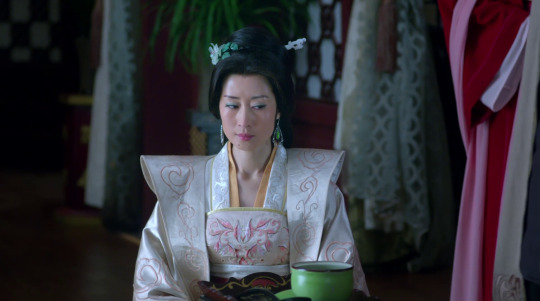
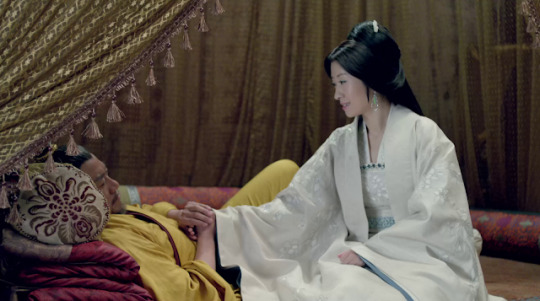
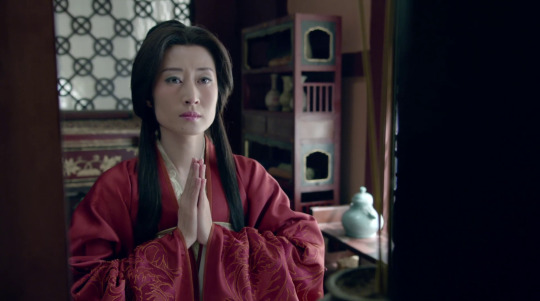
I love you, Consort Mom.
Are you ready to watch it yet?
Get it on Viki! Get it on YouTube! Get it on YouTube but in a different playlist! (And also maybe get it on Amazon? Not in my region, but maybe in yours.)
I will warn you that it does take off running -- I think I saw someone say it introduces nineteen characters in the first episode? I was worried that I'd be too innundated by situations and flashbacks and names to be able to follow. By the second or third episode, though, I was rolling with it. So if you feel like you're struggling at the beginning, stick with it a bit. See if you don't feel it start to click.
...Man, reading over this post has left me going, oh, but I missed that! and that! and that guy! And yeah, the truth is that there are just so many great things about the show that limiting myself to only five (and being limited to only thirty images) was tough. I'm sure that people reblogging will add their own must-see elements.
Truly, this is a show that deserves its reputation. It may not be for everyone, but if this is the kind of thing that you like, it is a shining example of that thing.
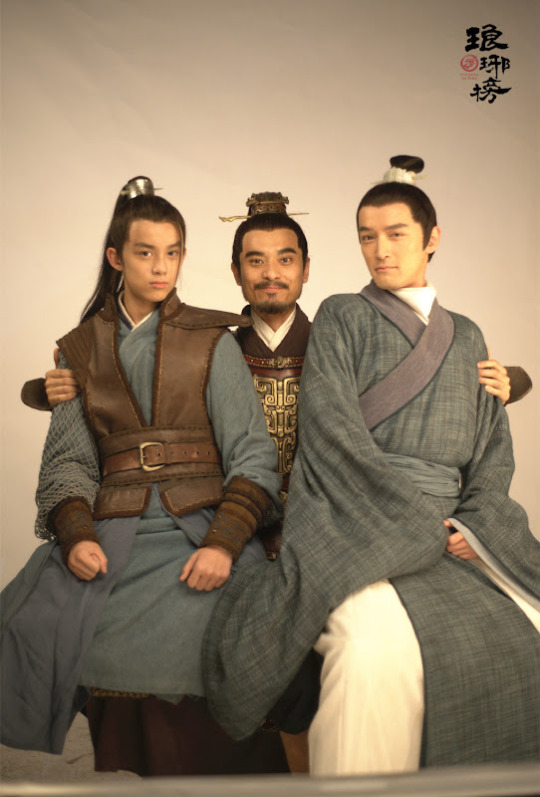
Besides, you have to love a production where everyone was clearly having just a whole lot of fun being big ol' costumed dorks.
378 notes
·
View notes
Text
Alex Kurtzman saying lower episode counts helps make "every episode count" and avoids filler since when can "we all know" which of those old Trek episodes were "spinning their wheels" when literally every story arc in the modern serialized live action Trek era has been padded to hell. Picard spent three episodes to get into space, and half a season stuck in a nebula, Picard season two has two episode's worth of plot expanded to ten hours from mostly pointless subplots, and even Disco's best season had a back half full of "okay we found them, whoops nope" episodes but uh they don't have lizard babies anymore so it's better
Just. Filler and wheel spinning *from what*? What plot is it distracting us from. Exploring strange new worlds and boldly going where no one has gone before is the only plot
189 notes
·
View notes
Text
I try to stay away from negative topics, but after hearing talk on social media yesterday and seeing this post from @such-a-downer, I just had to give my two cents about the complaints regarding yesterday's chapter being "another short mission" and that Endo is somehow being "lazy" or whatever.
I honestly don't understand this mentality of criticizing manga-ka, or any artists really, because they aren't delivering by whatever standards you personally think are appropriate. To me, it just seems like entitlement because Endo has no obligation to cater to any specific fan's wants. This is his story to tell the way he wants, and his characters to develop at the pace he deems fit. This isn't a business contract where we're paying him to deliver content we want every two weeks without fail. If I'm consuming the fruits of someone's creative labor for free, I certainly feel no right to complain if sometimes their content isn't what I wanted or expected. I'm fine with that because 1) I know it's what they (the creator) wanted/needed at the time, and 2) even if a particular chapter wasn't my cup of tea, I know other fellow fans out there somewhere are enjoying the heck out of it, and that's cool!
We also have to remember that SxF is basically a one-man show. If Endo is busy or sick or whatever, it's not like he can have someone fill in for him to write and draw the series. That's what a hiatus is for, that's what making a short chapter instead of a longer one is for...that's how artists should be treated so they don't get burned out and stressed. Plus, art shouldn't be rushed. Any artist knows that there are times when you have trouble coming up with ideas and maybe need a little extra time to develop a more complex section of the story. To immediately jump to conclusions that he's lazy or doesn't know what he's doing is ridiculous. Maybe he didn't feel good for a few days, maybe he's been busy with other SxF events, maybe he just needed more time to get a particular future arc developed, or maybe he just has basic IRL obligations to take care of like we all do...you don't know what's going on in his life, so don't make assumptions.
Another thing to keep in mind is that it's literally impossible to please every fan. One of the comments I read for example, someone was ready to drop the series because we haven't seen much of Yor in "a while." All I could think of was "didn't she just have a pretty big role only four chapters ago when they went to the ski resort?" Plus she was the star of chapter 91, which was less than ten chapters ago. So according to this person's standards, four chapters without seeing a particular character is "too long"? What if it was only three chapters, would that be acceptable? It's not right to push our own personal standards of a series' pacing as the "correct" way: some people want to see more of character X while someone else wants to see more of subplot Y, so should both complain that the manga-ka isn't doing right whenever they focus on something else? I'm not saying you shouldn't make criticisms of a manga-ka's work, but the criticisms should come from within the narrative itself, not superficial things like chapters focusing on subplots/characters you don't want to see or not having enough "plot-advancing" content when it's not a plot-focused series.
People who have read SxF up to this point should know the general flow of the chapters: mostly slice-of-life episodic, with more plot-heavy, intense arcs once in a while, like the cruise arc and bus arc. It's an ensemble series that spends most of its chapters focused on at least one of the Forgers, but occasionally other characters here and there. That's how the series has been for years and will likely continue to be. So if you keep complaining because you only like the dramatic story arcs and not the "nothing happens" episodic chapters, then maybe the series just isn't for you. It's totally fine if that's the case, but don't act like Endo is doing something wrong because he's not providing the particular thing you want in his story.
To summarize, Endo has no obligation to cater to particular fans' standards, just as we have no obligation to keep reading his work if we don't like it. But being a fan to me means respecting the creator's pace and vision even if it's not always what I personally want. I can find something to enjoy in every chapter because I'm a fan of SxF, not a fan of one particular aspect of it. But I also will not complain every time my tastes aren't being catered to and will simply occupy myself with other things while I wait. What's the big hurry, after all? I'm in no rush for SxF to wrap up its plot and I'm glad Endo isn't rushing either.
And that's all I'm gonna say about this topic, lol. On a happier note, I'm going to finally see Code White on Thursday! 😁 More to come later~
187 notes
·
View notes
Text
Ok, I think I might be exiting the "are you fucking kidding me?" period and ready to make a real argument, so lets talk about Three Act Structure!
Is OFMD S2 just the "Darkest Hour"?
A very common explanation I've been seeing for some of the... controversial... aspects of S2 is that it's meant to be that way. That the middle act is where the protagonists hit their lowest point. Where we get the big failure point. Where everything looks kind of shit.
S2 is supposedly just that point. It's The Empire Strikes Back. People have been making that comparison since before the first episodes even dropped, telling everyone to expect something that could be disappointing or unsatisfying - it's just a matter of needing to wait for S3 to pull it all together.
It's not a baseless framework to consider the show through - I'm pretty sure David Jenkins has mentioned it in interviews (or at least mentioned he planned for three acts / seasons) so it's certainly worth asking how he's doing at the 2/3rd mark.
So - quick summary of Three Act Structure:
Act 1 introduces our characters and world. It includes the inciting incident of the story and the first plot point, where a) the protagonist loses the ability to return to their normal life, and b) the story raises whatever dramatic question will drive the entire plot. Act 2 is rising action and usually most of the story. The protagonist tries to fix things and fucks them up worse, in the process learning new skills and character developing to overcome their flaws. Act 3 is the protagonist taking one more shot, but this time they are ready. We get the climax of the story, the dramatic question gets an answer, and then the story closes.
If you want examples, the Star Wars Original Trilogy is a very popular template. And, hell, he said it was a pirate story... the main Pirates of the Caribbean trilogy also does a solid job with their three acts.
Let's compare. (Spoiler: I'm not impressed 🤨)
---
First thing I need to establish... Wait. Two things. First is that Three Act Structure is flexible, so we can't really analyze success or failure by pulling up a list of necessary plot beats that should have been hit in X order. Second is that if you tell me you are writing a romance with a Three Act Structure - where "the relationship is the story" - the first thing I'm going to do is ask you how you are adapting it. Because while there's not necessarily anything preventing you from applying this to a character driven plot, most people are familiar with it as plot structure for externally driven conflict.
Unless there's a reason the status of the main relationship is intrinsically tied up in the current status of the war against the evil empire, a standard Three Act Structure is going to entail either an antagonistic force that absolutely wants your main couple apart being the main relationship obstacle OR the romance aspect being a subplot to the protagonist's narrative adventure. None of those sound like how the show has been described.
So how is OFMD adapting it?
---
Act 1
(Can't figure out how well Act 2 is doing if we don't start at setup.)
Right out the gate, OFMD breaks one of the main "rules" for a story where the Acts are delivered in three parts. Namely the one where the first Act is treated as an acceptable standalone story, with it's own satisfying yet open ended conclusion.
In Star Wars, A New Hope ends with the princess rescued, Luke finding the Force, Han finding his loyalty, and the Death Star destroyed. The Empire isn't defeated, the antagonists still live... the story is not over, but this one movie doesn't feel unfinished.
Similarly, Curse of the Black Pearl gives Jack his ship back, Elizabeth and Will get together, and Norrington has the English Navy let them all off the hook and give Jack and the pirates one day's head start.
OFMD's final beat of S1 being Kraken Arc starting is not that, even if Stede returning to sea is still a pretty hopeful note. Now... I don't necessarily think this was a bad call. At least, not if the story is the relationship. It's easy to close on a happy ending and then fuck it up next movie if the conflict is external and coming for them. Not so much if you're driving the story with your protagonists' flaws, in part because it should be really obvious at the end of setup that your main characters need development and can't run off together right now. I actually like that they were risk-takers and let S1 look at the situation clearly vs doing a fragile happy end, because it takes into account the difference between a character-driven and plot-driven narrative.
I think OFMD's Act 1 actually ends at maybe the Act of Grace? Well, there through the kiss on the beach, counting as our "first plot point" before everything goes wrong, basically.
At that point, they have setup the story and characters. We've been introduced to Edward and Stede's current issues. Signing the Act of Grace does make the intertwined arcs between them real - it's no longer a situation that either one of them could just walk away from like it was in 1x07 - and we narrow in on the (alleged) driving question of the show:
It's not about "Will Stede become a great pirate?" or "Will we develop a better kind of piracy for the crew?" - the show is the relationship and the big question is "What is Stede and Edward's happy ending?"
Act 1 ends on their first solution, being together and making each other happy and admitting it's more than just friendship. Act 2 starts, appropriately, by saying both of them are currently too flawed for that to go anywhere but crashing and burning.
Now... looking back, what does Act 1 do well vs poorly?
I think it's really strong on giving us the foundation for BlackBonnet's characters and flaws. We aren't surprised Stede goes home or Edward goes Kraken (or at least... we weren't supposed to be surprised. There are still a lot of holdouts blaming Izzy for interrupting Edward's "healing" despite how at this point in the story it doesn't make sense for Edward to have the skills to heal... but I digress). The relationship question is compelling at the end of S1, the cliffhanger hooks, and the fandom explosion of fics did not come from nowhere - the audience was invested.
I also think Act 1 does a great job of settling us in the universe. We understand the rules it abides by, from how gay pirates are just a fact of life to how there's no important organs on the left side of the body. Stede has a muppety force field. Rowboats have homing devices, and port is always as close as you want it to be. Scurvy is a joke. The overblown violence of pirate life is mostly a joke, but we are going to take the violence of childhood trauma seriously.
Lucius's fake-out death, while technically part of Act 2, works well because Act 1 did a good job of priming everyone to go "obviously this show wouldn't kill a crew member for shock value, and we're 100% supposed to suspend disbelief about how he could have survived getting flung into the sea in the middle of the night." And we do. And we get rewarded for it.
Regarding antagonists - a big focus of any setup - the show is deliberately weak. The one with the most screentime is Izzy, and he's purposefully ineffective at separating our main couple. Every antagonist is keyed to a particular character, and they function mostly to inform us of that character's flaws and development requirements. The Badmintons tell us about Stede's repression and feelings of inadequacy, and Izzy tells us about Edward's directionless discontent and tendency to avoid his problems. Effectively - the show is taking the stance this will be a character driven narrative where Stede and Edward's flaws are the source of problems and development the solution. No person or empire (or social homophobia) is separating them...
...which leads me to something not present - there nothing really about the struggle of piracy against the Empire. Looking at Curse of the Black Pearl... we see piracy is in danger. The Black Pearl itself is described as the last great pirate threat the British Navy needs to conquer. Hangings are omnipresent - Jack is sentenced to die by one almost as soon as he's introduced to the story, when his only act so far had been to wander around and save Elizabeth from drowning. OFMD tries to invoke this kind of struggle in 2x08, but there's no foundation. Our Navy antagonists are Stede's childhood bullies, and so focused on Stede the crew isn't even in danger when they get caught. The Republic of Pirates is getting jokes about being gentrified, not besieged.
Even the capture of Blackbeard by the Navy is treated as a feather in Wellington's cap but not a huge symbolic blow against piracy... because we just do not have that grand struggle woven into Act 1. You only know the "Golden Age of Piracy" is ending if you google it, or have watched a bunch of pirate shows.
Overall, a solid Act 1, well adapted to the kind of story they've said they were looking to tell - a romance in the (silly-fied) age of piracy, instead of a pirate adventure with a romantic subplot.
---
Now, Sidebar - Where is the story going?
The thing about the dramatic question - in OFMD's case: "What is Stede and Edward's happy ending?" - is that a) there's normally more than one question bundled up in that one + sideplots, and b) while you aren't supposed to have the answer yet, you can usually guess what needs to happen to give you the answer.
Back to our examples... Luke's driving question is "Will the Empire be defeated?" Simple. Straightforward. Also: "Will Luke become a Jedi?" The eventual climax of our story from there is pretty obvious... the story is over when Luke wins the war for the Rebellion in a Jedi way. That's the goal that they are working toward.
Pirates of the Caribbean is a bit more complicated. We're juggling more characters and have a less defined heroic journey, but there are driving questions like "Is Jack Sparrow a good man?" and "Is Will Turner a pirate / what does that mean?" and even "Will the British Navy defeat piracy?" They get basic answers in Curse of the Black Pearl, and far more defined ones in At World's End. Still, this is another plot-driven narrative. They've laid the foundations for the Pirates vs Empire struggle, and when that final battle turns into the trilogy climax then you know what's happening.
OFMD is not doing a plot-driven narrative. To judge how they are doing at their goals, we have to ask what they think a happy ending entails in a character sense.
Clearly it's not the classic romantic sideplot, where the climax is the first kiss / acknowledgement of feelings. They've teased a wedding in Word of God comments a lot, so that's probably our better endpoint. Specifically, though, a wedding where both of our protagonists aren't ready to flee from the altar (big ask) and where they've both grown enough that their flaws / mutual tendencies to run away from life problems won't tank the relationship.
In Stede's case it's still massive feelings of inadequacy and being too repressed to talk about his problems. Also he ran away from his family to chase a lifelong dream of being a pirate - "Is Stede going to find fulfillment in being a pirate captain, or will the real answer be love?" Edward meanwhile expresses a desire to quit piracy and retire Blackbeard, but we also find out he's struggling with massive self-loathing and guilt from killing his father - "Is retiring what Edward wants to do, or is he just running away?"
If they are going to get to a satisfying wedding beat at the climax of their story, what character beats do we need to hit in advance?
Off the top of my head - both characters need to self-realize their flaws (a pretty necessary demand of anyone who runs away from problems). They are set up to balance each other well, but also to miscommunicate easily. They have to tell each other about or verbally acknowledge that self-realization so it can be resolved. Stede has to decide how much being a pirate means to him. Edward has to decide if he's retiring and what he wants to do. They both need to show something to do with getting past their childhood traumas given all the flashbacks. Through all this, they also need to hit the normal romance beats that convince the audience they are romantically attracted to each other and like... want to get married.
Oh, and this is more of a genre-specific sideplot, but once they demonstrate a behavior that hurts the people who work for them, they need to then demonstrate later how it won't happen again. Proof of growth, which is kind of important in a comedy where a lot of the humor is based in them being massively self-centered assholes. Stede doesn't earn his acceptance in the community until he kicks Calico Jack off the ship, making up for causing the situation with Nigel in the first episode. A workplace comedy can get a lot of material from the boss as the worker's antagonist, but if you want the bosses to stay sympathetic you have got to throw them some opportunities to earn it.
All that sounds like a lot, but like - the relationship is the story, right? If we spend so much time on establishing flaws big enough to drive a story, we also have to spend time on fixing them. Which is where the turning point hits.
---
Act 2: How it Starts
This is where the full story reality-checks your protagonist. Glad you saved your boyfriend and embraced new love in Act 1, but his repressed guilt means he's about to completely ghost you, and your own abandonment issues and self-loathing are about to make his dick move into everyone else's problem.
Again, it's a non-conventional choice OFMD has this start at the very end of S1 rather than with a sudden dark turn in the S2 premiere, but it's still pretty clearly that point in the Three Act Structure.
In Star Wars, The Empire Strikes Back opens with a timeskip to our Rebellion getting absolutely crushed and hiding on a miserable frozen planet. The Empire finds them as the plot is kicking off and they have to desperately flee. They get separated. Han and Leia try to go to an ally for help and end up in Vader's clutches. It's a sharp turn from the victorious note that A New Hope ended on.
Pirates of the Caribbean's Act 2 starts dark. Dead Man's Chest opens with our happy couple Will and Elizabeth getting arrested on their wedding day for the "happy end" escape of the last movie. Jack has not been having success since reclaiming his ship, and we'll soon find out he's being hunted by dark forces. As for the general state of piracy, we get a horrifying prison where pirates are being eaten alive by crows, and a new Lord Beckett making the dying state of piracy even more textual. "Jack Sparrow is a dying breed... The world is shrinking."
The key here is making a point that our heroes aren't ready. This is the struggles part - things they try? Fail. The odds do not look to be in their favor.
Now, OFMD apparently decided to go all-in on flaw exploration, especially with Edward. The first 3 episodes of S2 are brutally efficient in outlining Edward's backslide. In S1 you could see he had issues with guilt and feeling like a bad person. S2 devolves that into a destructive, suicidal spiral where Edward forces his crew into three months of consecutive raids, repeats his shocking act of cruelty with Izzy's toe offscreen (more than once!), escalates it with his leg, and finally they state directly that Edward hates himself for killing his dad so much that he fears he's fundamentally unlovable and better off dead.
Stede's struggles are subtler, but most definitely still there. He's deliberately turning a blind eye to tales of Edward's rampage, half from simply being too self-centered to care about the harms Edward causes others, and half from being unable to face or fathom that he had the ability to hurt Edward that much. Upon reunion he wants to put the whole thing behind them, not addressing why he left in the first place. Very "love magically fixes everything" of him, except Stede is no golden merman.
Interestingly, here, BlackBonnet's relationship dysfunction has very clearly been having a negative impact on the surrounding characters we care about. Make sense, since it's the driving force of the story, but that also adds a lot more relationships we need to make right. Like... Edward is the villain to his crew. The show focuses on their trauma and poisoned relationships with him. And then draws our attention even more to Stede taking his side to overrule their objections to him.
For a story where the conflict and required resolutions are primarily character based, and the setup had already given the main couple a good amount to work with, dedicating a lot of S2 to adding more ground to cover was... a choice. Potentially very compelling on the character end, certainly challenging on the writing end... but not a complete break with the structure.
Bold, but not damning.
---
Act 2: How it Ends
Now it is true that Act 2 tends to end on a loss. Luke is defeated by Vader and loses his hand, and Han has been sent away in carbonite. Jack Sparrow for all his efforts cannot escape his fate, and he and the Pearl are dragged to the locker.
But the loss is not the point. The loss is incidental to the point.
Act 2 is about struggles and failure, but it's also about lessons learned. There's a change that occurs, and our cast - defeated but not broken - enters the final act with the essential skills, motivation, knowledge, etc. that they lacked in the beginning.
Luke Skywalker could not have defeated the Empire in Return of the Jedi until he'd learned the truth about his father and resisted the Dark Side in The Empire Strikes Back. (Ok, confession, I'm using Star Wars as an example because literally everyone is doing so, but frankly it's a better example of formulaic Three Act Structure repeating within each movie because on a trilogy level - relevant to this comparison - it is a super basic hero's journey in a very recognized outfit and as such the Act 2 relevance is also... super basic "the hero tries to fight the antagonist too early" beat where he learns humility. Not really a lot going on. So, for the better example...)
Dead Man's Chest has a downer ending with the closing moment of the survivors regaining hope and a plan against an enemy now on the verge of total victory - a classic Act 2. But in that first loss against Davy Jones we get Will's personal motivation and oath to stab the heart, Jack finally overcoming not knowing what he wanted and returning to save them from the Kraken (being a good man), Elizabeth betraying Jack (being a pirate), Barbossa's return, and Norrington's choice to bargain for his prior life back. The mission to retrieve Jack from the World's End is the final movie's plot, but things are already on track to turn the tables back around as we enter the finale.
Now, relevant sidenote - one major difference between Three Act Structure within a single work vs across three parts is that Act 2 continues into Part 3, and only tips over into Act 3 about midway through. This is because obviously your final movie or season cannot just be the climax. That's why both movie examples start with a rescue mission. They have to still be missing something so they can get the plot of their third part accelerating while they go get whatever that something is.
But if you wait until the 3rd movie / season to get the development going at all - you're fucked.
Jack's decision in the climax of At World's End to make Elizabeth into the Pirate King goes back to the development we saw in the Pearl vs Kraken fight in Dead Man's Chest. So does Elizabeth's leadership arc. Will's whole arc about becoming Captain of the Dutchman gets built upon in the third movie, but it starts in the second. Not just as an idle thought - he's actively pursuing it. Already consciously weighing saving his father vs getting back to Elizabeth as soon as he makes the oath. Everyone is moving forward in Act 2. Their remaining development might stumble for drama, or they might be a bit reluctant, but I know that they know better than to let it stick, because they already faced their true crisis points.
I'm not sure we can say the same about OFMD.
S2 does a good job of adding problems, yeah, but there's not really any movement on fixing them. Our main couple stagnates in some ways, and regresses in others.
Stede opened Act 2 by running away in the middle of the night back to his wife without telling Edward anything. We know he did it because of feeling guilty and his core childhood trauma of his dad calling him a weak and inadequate failure. Now in S1 he actually speedruns a realization of his shitty behavior with Mary, but what about S2? Well...
He continues to not talk to Edward about... pretty much anything. My guy practiced love confessions galore but Edward only finds out about going back to his wife via Anne, and it gets brushed aside with a love confession. He seems to think Edward wants him to be a dashing pirate, or maybe he just thinks he should be a dashing pirate. Idk, it doesn't get examined. Regarding his captaincy, they give him an episode plot about Izzy teaching him to respect the crew's beliefs, but this is sideplot to a larger arc of him completely overruling their traumas and concerns (and shushing their objections) to keep his boyfriend on the ship so. That.
Stede kills a man for reasons related to his issues, shoves that down inside and has sex with Edward instead of acknowledging any bad feelings. At least this time Edward was there and knows it happened? Neither Chauncey's death nor his dad have been mentioned to anyone. He gets a day of piracy fame that goes to his head, gets dumped, and ends on a complete beat down by Zheng where he learns... idk. Being a boor is bad? He's still wildly callous to her in the finale, and spends the whole time seeking validation of his pirate skills. He reunites with Edward, kisses, and quotes Han Solo.
Where S1 ended on a great fuckery, his S2 naval uniform plan after they regroup is ill defined except to call it a suicide mission - and we don't get to see what it would have been because it devolves into a very straightforward fight and flee. And gets Izzy killed. Quick cut funeral (no acknowledgement of his S2 bonding with Izzy), quick cut to wedding (foreshadowing), quick cut to... innkeeper retirement? Unclear when or even if BlackBonnet discussed Stede's whole driving dream to be a pirate and live a life at sea, but I guess that got a big priority downgrade. Despite the fact he was literally looking to Zheng for pirate-based compliments in the post-funeral scene.
I guess he's borderline-delusionally dogged in his pursuit of love now - so unlikely to bolt again - but he's also got at least a decade of experience mentally checking out in a state of repression when he's unhappy. And he's stopped being as supportive and caring toward the crew in that dogged pursuit, while arguably demonstrating a loss in leadership skills, so, um, good thing someone else is in charge?
And if Stede is a mess, Edward's arc is so much worse.
As established, they devote the Kraken to making Edward worse. He literally wants to kill himself and destroy everyone around him in the process because Stede left, and this is fixed by... Stede coming back. That's it. The crew tries to murder him and then exiles him from the ship (and Izzy takes the lead on both, indicating exactly how isolated Edward has become), but it's resolved in half a day by Stede just forcing them to put up with his boyfriend again. Like they think he murdered Buttons and still have to move him back in???
The show consistently depicts Kraken Era as a transgression against the crew, but they also avoid showing Edward acting with genuine contrition. He admits he historically doesn't apologize for anything, and then mostly still doesn't. It's a joke that he's approaching probation as a performance (CEO apology), and then the only person he genuinely talks to is Fang - the one guy cool with him - and the only person who gets a basic "sorry" is Izzy - the guy he really needs to be talking to. Edward's primary trauma is guilt, but apparently he only feels it abstractly after all that? He's only concerned with fixing things with Stede, despite Stede being about the only person around who hurt him instead of the reverse.
Speaking of primary traumas, Edward hating himself doesn't really go anywhere after the beat of self-realization. Apparently Stede still loving him is enough of a bandaid to end the suicide chasing, but he doesn't like. Acknowledge that. Edward is maybe sorta trying to go slow so he doesn't hang all his self-worth on Stede again (you can speculate), but they a) absolutely fail to go slow, and b) he doesn't make any attempt to develop himself or another support structure. Just basically... "let's be friends a bit before hooking back up." And then we get the whiplash that is Blackbeard and/or retirement.
Kraken Era is Blackbeard but way worse, like no one who has known Blackbeard has ever seen him. In the Gravy Basket Edward claims he might like being an innkeeper, before destroying his own fantasy by having the spectre of Hornigold confront him over killing his dad. The BlackBonnet to Anne & Mary parallel says running away to China / retiring makes you want to kill each other - burn it all down and go back to piracy. Stede rightfully points out prior retirement plans were whims. Edward gets sick of the penance sack after a day and puts his leathers back on to go try "poison into positivity". But also claims to be an innkeeper (look - two whole mentions!) when trying not to send children to be pirates after teaching them important knife skills.
Killing Ned Low is a serious, bad thing that prompts ill-advised sex and then going hardcore into retirement mode - leathers overboard, talk about mermaid fantasy, get retirement blessings from Izzy, end up dumping Stede for a fishing job instead of talking about how he's enjoying piracy. The fishing job, however, is also a bad thing and a stupid decision because Edward is a lazy freeloader fantasizing about being a better person. We have an uncomfortable, extended scene of "Pop-Pop" weirdly echoing his abusive dad and then sending Edward to go do what he's good at - disassociate, brutally murder two guys, fish up the leathers, rise as the Kraken from the sea. He continues with comically efficient murder but also he's reading Stede's love letters and seeking to reunite with him so... wait, is this a good thing? Post makeout / mass slaughter he's trading compliments on his kills with Zheng so. Yeah. Looks like it. Murder is fine.
Wait, no, skip ahead and Izzy is dying and Edward suddenly cares a whole lot as Izzy makes his death scene about freeing Edward from Blackbeard. Now being a pirate was "encouraging the darkness" because Izzy - a guy who had little to no influence over Edward's behavior - just couldn't let Blackbeard go. Murder is bad again, and he is freed. Minus the little detail that the murder he explicitly hates himself over was not related to Blackbeard or piracy whatsoever, so presumably haunts "just Ed" still. Anyway he's retiring to run an inn with Stede now, as the "loving family" Izzy comforted him with in his dying moments sails away from the couple that can best be described as the antagonists of their S2 arc. Also Edward implicitly wants to get married. It's been 3 days since making out was "too fast". He's still wearing the leathers.
So most of the way through Act 2 and Edward's barely on speaking terms with anyone but Stede, who he has once again hung his entire life on really fast? Crushing guilt leads to self-hatred leads to mass murder and suicide, but only if he's upset so just avoid that. He's still regularly idealizing Stede as a non-fucked up golden mermaid person (that maybe he personally ruined a bit) because he barely knows the guy. His only progress on his future is "pirate" crossed out / rewritten / crossed out again a few times, "fisherman" crossed out, and "innkeeper ?"
Just.
Where is the forward movement?
It's not just that the inn will undoubtedly fall apart - it's that the inn will fall apart for the near-exact same reasons that China was going to at the beginning of Act 2, and I can't point to anything they've learned in the time since that will help them. I guess Stede realized he loved Edward enough to chase after him, but that was in S1! They should be further than this by now. You can't cram another crisis backslide, all the Act 2 development, and the full Act 3 climax into one season. Certainly not without it feeling like the characters magically fix themselves.
If they just fail and keep blindly stumbling into the same issues because they don't change their behavior, then Act 2 doesn't work. You're just repeating the turning point between Act 1 & Act 2 on a loop.
---
Where Did They Fuck Up?
Actually... lets start on what they did right.
The one consistent aspect of S2 that I praised and still think was done well in a vacuum (despite being mostly left out of the finale) was the crew's union-building arc.
With only 8 episodes and more to do in them than S1, side characters were going to get pinched even if the main plot was absolutely flawless. That was unavoidable. With budget cuts / scheduling issues, we regularly have crew members simply vanish offscreen outside of one scene, meaning cohesive arcs for your faves was not likely. Not to say they couldn't have done better - my benefit of the doubt for the TealOranges breakup and Oluwande x Zheng dried up about when I realized he was literally just her Stede stand-in for the parallel - but something like Jim's revenge plot from S1 was realistically not on the table without, like, turning half the crew into seagulls to afford it.
The union building works around this constraint really well. They turn "the crew" into the side arc, and then weave Izzy's beats in so that they aren't just about Izzy. The breakup boat crew working together to comfort each other and protect him turns them into a unit, and Stede's crew taking it upon themselves to address the trauma vibes while the captains aren't in the way solidifies it across all our side characters. The crew goes to war with Stede's cursed coat and wins, they Calypso their boss to throw a party, and they capitalize on a chance to make bank with an efficiency Stede could only dream of.
We don't get specific arcs, but Frenchie, Jim, and Oluwande are defaulted to as leaders in just about every situation, and Roach is constantly shown sharing his inventions with different characters. Individuals can dip in and out without feeling like the sideplots stutter. Any sense of community in S2 is coming from this arc - even if there are cracks at the points where it joins to other storylines (Stede and Edward, Zheng, etc.)
So why does it work? Well, because it's a workplace comedy, and you can tell they are familiar with working on those. They know where the beats are. They know where to find the humor. They know how to build off of S1 because they made sure the bones were already there - an eclectic group of individuals that start as just coworkers, but bond over time in the face of their struggle against an inept boss who they grow to care for and support while maintaining an increasingly friendly antagonism because, you know, inept boss.
OFMD does its best work in S2 when it's being true to its original concept... and its worst work when it seemingly loses confidence in its own premise.
"The show is the relationship," right? It's a romance set in a workplace comedy. The setup of Act 1 was all about creating a character-driven narrative. So given that... where the hell are we getting the dying of piracy and a war against the English Navy?
That's not a character-driven romcom backdrop, it's an action-adventure plot from Pirates of the Caribbean or Black Sails. It's plot-driven, creating an antagonistic force that results in your characters' problems. Once the story is about the fight against the Empire, the dramatic question becomes the same as those adventure stories - "Will the British Navy defeat piracy, and will our protagonists come out the other side of the battle?"
Forget the wedding. The wedding is no longer the climax of the story, its back to the happy ending flash our romantic subplot gets after winning this fight.
Except, of course, trying to pivot your story to a contradictory dramatic question near the end of Act 2 can be nothing short of a disaster, because either you were writing the wrong story until now, or you've completely lost the plot of the real one. I shouldn't even be trying to figure out if they are doing this, because it should be so obvious that they wouldn't.
And yet.
What do the Zheng and Ricky plots add to the story if not this? Neither of these characters have anything emotionally to contribute to Stede and Edward - they truly are plot elements. It's a hard break from the S1 antagonist model, but it also takes up a lot of valuable screentime. This was considered important, but still Zheng's personality and motivation only gets explored so far as it's an Edward-Stede-Izzy parallel with Oluwande and Auntie, and they only need the parallel for Izzy's genre-jumping death scene. Which follows a thematically out-of-left-field speech about how piracy is about belonging to something good (workable) and how Ricky could never destroy their spirits (um...?). And then David Jenkins is pointing to it and saying things about "the symbolic death of piracy" and speculating S3 might be about the crew getting "payback"??? An idea floated by Zheng right before our temporary retirement, btw.
Fuck, the final episode of S2 didn't have time for our main couple to talk to each other because it was so busy dealing with the mass explosion of Zheng's fleet and Ricky's victory gloat. We get lethal violence associated with traumatic flashbacks until they need to cut down enemy mooks like it's nothing, at which point we get jokes with Zheng. The Republic of Pirates is destroyed outright, and it feels like they only did it because they got insecure about their "pirate story" not having the right kind of stakes. Don't even get me started on killing a major character because "Piracy’s a dangerous occupation, and some characters should die," as if suspending disbelief on this aspect makes the story somehow lesser, instead of just being a fairly standard genre convention in comedy. Nobody complains about Kermit the Frog having an improbably good survival record.
Did someone tell them that the heroes have to lose a battle near the end of Act 2, so they scrambled to give them one?
Just... compare the wholly plot-driven struggle in 2x08 to Stede and Edward's character-focused storylines in 1x10 and tell me how 2x08 is providing anything nearly as valuable to the story. Because I can't fucking find it.
At best they wasted a bunch of time on a poorly integrated adventure plot as, like, Zheng's backstory or something, and just fucked it up horribly by trying to "step up" the kind of plot they did for Jim. In which case the whole thing will be awkwardly dropped but damage is done. Otherwise, they actually thought they could just casually add a subplot like this because they've done something wildly stupid like think "pirate" is a genre on the same level as "workplace comedy" and can just trample in-universe coherency while you draw on other media to shore up their unsupported beats.
Bringing us to the most infuriating bit...
---
"...end the second season in a kinder spot."
If this was the goal, the entire season was written to work actively against it in way that is baffling and incompetent.
The really ironic thing is that the reason that the Act 2 part typically gets a downer ending is because of the evil empire that OFMD did not have to deal with until they pointlessly added it. A plot-driven story has an antagonistic force - a villain - that the heroes need to defeat. Something external working against them. The story ends when they beat the thing, and it's not much of a climax if they do most of the defeating before you get there. Ergo, they have to be outmatched up to the climax. Ergo, the second part cannot end on them feeling pretty comfortable and confident going into the third.
The same rules do not apply in the same way to a character-driven arc.
We already established Edward and Stede declaring their love is not the end of the story. Nor, necessarily, is both of them confidently entering a relationship. Even once they've developed a bunch they will have to show that development by running into the kinds of problems that would have broken them up before and resolving them better.
David Jenkins keeps talking about this idea that S2 is getting a hopeful open ending and S3 will get into potential problems, and like... I don't see any reason why they couldn't have done that successfully. They didn't, but they could've.
If S2 grew them enough as characters and then had them agree to try again in the last minute of the finale, they absolutely could have had a kind and hopeful ending where you were confident they could do it. And then a potential S3 can show that. It's a bit rockier than they were counting on, but they have learned enough lessons to not break up. And then the overall plot can build to proposal (start of Act 3) and wedding (the romantic climax). It doesn't have to be a blow out fight to be emotionally cathartic.
(Hell, the main rockier bit that they overcome in the S3 Act 2 portions could be marriage baggage. I'm sure they both have some. It would work.)
In the same way focusing on our character's long term flaws and character-driven conflict makes an Act 1 "happy ending" more difficult, I suspect it makes an Act 2 "happy ending" easier.
Instead they wrote an Act 2 that failed to convincingly start development and got confused on its direction, and then presented a rushed finale ending in a copy of the predictable disaster from S1 as though it's a good thing. They yanked the story at least temporarily into an awkward place where a romcom is trying to sell me on a bunch of serious drama / adventure beats that it has not put the work into, and inviting comparisons to better versions of those same beats in other, more suited media that make it look worse. The need to portray everyone as reaching happy closure overrules sitting with a major character death and using it for any narrative significance, while still letting it overshadow those happy endings because a romcom just sloppily killed a major character with a wound they've literally looked into the camera and said was harmless.
If I'm being entirely honest, Dead Man's Chest ends effectively at Jack Sparrow's funeral and then cuts to the British Navy obtaining a weapon of mass destruction, and it still feels kinder and more hopeful just because I leave with more faith the characters are actively capable of and working toward solving their problems.
OFMD S2, in contrast, has half-convinced me our main couple would live in a mutually obsessed, miscommunication-ridden horror story until they die.
---
Additional Reading
Normally I link stuff like this in the post, but that requires more excitement than I'm feeling right now. Here's my alternative:
Where I thought they were going with Edward - really outlines the mountain of character development they still have unaddressed
Where I thought they were going with Izzy - touches on a lot of themes that might be dead in the water & also context that's still probably relevant to why Izzy got a lot of focus in S2
My scattershot 2x08 reactions
An ask where I sketched out the bones of this argument, and another where I was mostly venting about the fandom response
This one, this other one, and this last one (read the link in op's post too) about genre shifts and failure to pull them off
The trauma goes in the box but it never opens back up - the whole point of Act 2 is that they needed to start opening shit like that - and also they focus so much on needed character growth and so little on following through
They can't even carry through on character growth that we got last season???
Why Izzy's death feels like Bury Your Gays ran smack into shitty writing
EDIT: Oh and this post is REALLY good for outlining the lack of change in way less words than I did
#our flag means death#ofmd#ofmd s2#ofmd s2 spoilers#ofmd meta#three act structure#character arcs#blackbonnet#genre#blackbeard ofmd#stede bonnet ofmd#my meta#ladyluscinia#ofmd critical
255 notes
·
View notes
Text
obviously I'd be thrilled to just get the whole PJO series adapted and then end it there. However: Heroes of Olympus as a story can be cleaned up sooooooo much in a way that PJO just doesn't need to be, and a tv adaptation offers the perfect opportunity to do so
like honestly my hottake is that I think Disney could solve both the problem of adapting a long, convoluted sequel series and a lot of the problems HOO as a story has if they a) do The Lost Hero and Son of Neptune in the same season and b) deliberately wait until the PJO actors are in their 20s to do it
Just thinking about this a bit more:
three 12-14 episode seasons, with TLH/SoN in S1, a modified MoA in S2 that deals with some of the Argo crews' HoH subplots, and then HoH/BoO in S3
Percy and Annabeth are in their 20s and newly engaged when he disappears. This sets up the arc of Percy dreaming about settling down with Annabeth in New Rome in a more organic, functional way and also gives us as viewers a chance to see that the aftermath of the Titan War has resulted in tangible, lasting change for the demigods of Camp Half-Blood
Grover replaces Coach Hedge as the Seven's collective Protector+chaperone, which solves the series' problem of Grover's absence and the absence of the PJO Trio's friendship
the whole show/story takes place over ~6 months instead of the year it did in the books, and Percy+Jason's individual quests happen concurrently (simply not letting Percy sleep for 8 months and making an episode where he establishes himself at the Roman camp for awhile before he's forced on the quest with Frank and Hazel would solve about half of the problems on the Roman side of the series)
Season-wise, things mostly sort themselves out:
The first season starts off introducing the Lost Hero trio and we find out that Percy's missing at the end of the first episode. The second episode opens with Percy waking up at the Wolf House and starting his journey to New Rome. We get one episode entirely devoted to amnesiac Jason and Percy integrating into the new camps, making friends, and learning about their missing counterpart before the quest plots start up.
The season then alternates between Jason, Piper, and Leo's "Find Hera" quest and Percy, Hazel, and Frank's Alaska quest, with intermittent jumps to the Greek and Roman efforts to find Percy and Jason. It ends with Percy and Jason regaining their memories and each camp realizing their leader is on the other side of the country in "enemy" territory.
The second season opens around a month later as the Argo II docks in New Rome. Percy and Jason have both been given time to make friends, integrate themselves into the opposing camp, and become adjusted to a different way of life with all of their memories intact. They haven't physically returned to their home camps as they've both independently come to the conclusion that Hera switched them to initiate inter-camp unity and are wary of doing anything that would disrupt that goal. However, Percy and Jason have both managed to get messages to Annabeth and Reyna respectively at some point in that month, so everyone knows everyone is safe when the Greeks finally arrive in New Rome.
Cue MoA's various plotlines, which would be cleaned up and streamlined significantly while also integrating in some of the HoH arcs like Hazel learning how to manipulate the Mist, Frank learning how to use his shapeshifting powers, Piper coming into her own as a daughter of Aphrodite, Leo's seventh wheel arc and the Calypso subplot, Jason struggling to figure out what his place is, the Jason-Nico friendship, etc. Also set up the Greek v. Roman dispute and Reyna following them to Greece. Season ends with the Annabeth-Arachne confrontation and Tartarus fall.
The third season combines HoH and BOO; the season alternates between Percy and Annabeth's journey through Tartarus while the rest of the Seven finish their various character arcs via gathering the elements for the Physicians' Cure and journeying to the Doors of Death. After they rescue Percy and Annabeth and close the Doors, they plan to head straight to Athens to take on Gaea. Reyna reaches them just after, and Annabeth sends her and Nico off with the Athena Parthenos with Grover as their Protector.
The final battle switches between The Seven+Gods vs. Gaea+The Giants at the Acropolis and the Greeks vs. Romans at Camp Half-Blood. The Gaea plotline is resolved at the Acropolis, the Greek-Roman plotline is resolved as Nico and Reyna triumphantly arrive at Camp Half-Blood with the statue, a functional Greek-Roman working relationship, and the gods' blessing. This helps streamline the mess that was Blood of Olympus and actually provides a workable story resolution.
We get a final aftermath/epilogue episode that sorts out and ties up all remaining plot threads, teases Solangelo, and ends with Percy returning home to see his mom and planning out how to move to New Rome after he and Annabeth get married.
Obviously this is the roughest possible sketch of how it could be done, but I genuinely believe doing something like that could fix some of the biggest issues HOO has conceptually while streamlining all of the quest bloat. It'd be interesting to see them try, anyway.
#pjo#pjo tv#heroes of olympus#hoo spoilers#my writing#.......sort of#percy jackson#annabeth chase#percabeth#jason grace
166 notes
·
View notes
Text
the thing about tom and greg is that yes, the nero and sporus scene in 3.04 for instance is homoerotic, tragic and heartbreaking, yes it says a lot about tom’s neuroticism/his unhappiness in his marriage/queerness, and greg’s ability to fend for himself/ability to see tom for who he really is etc but it is also one of the funniest and strangest scenes in the entire show.
tom and greg’s subplots have always been a vital component of succession - their dramatic function being primarily comedic does not make them inessential. this is after all a show that was developed by a comedic writer, who is also the showrunner, and is written by a core group of people who have long careers in comedy and satire. some of their finest work across the seasons has been with tom and greg, who are an incredibly popular aspect of the show for that reason.
i really love kendall, roman and shiv but while they quip and squabble and lie to each other and grieve, they don’t have the comedic truth of a dynamic like tom and greg. comic relief does not mean some inconsequential sidebar on succession (i would argue that it rarely does in anything, but that’s a different post), it’s necessary to the plot. it’s where the big dramatic themes are played with and mirrored, made absurd, even whimsical, and above all honest.
having to stuff so much plot into season 4 now logan has gone has absolutely decimated the show’s internal structure. not because they haven’t written subplots, we know they exist, but because they simply don’t have space to include them. succession used to be many things, and for three episodes now has been mostly one thing, because there is no time for B plot - it’s all A plot, all the time. it feels weighed down, as opposed to mercurial - like, i was just getting bored last episode. i was bored during a succession episode! we the audience need relief: it enhances the A plot significantly and always has done. now, it’s getting cut for time and without it the show is suffering. the shift in editing has made the drama mawkish, and the comedy insubstantial, neither of which are particularly enjoyable effects.
i’m really, really hoping they can find that equilibrium for these last four episodes. this post might sound overly critical, but i am still enjoying succession. i’m more frustrated by post production decisions, as it just feels like a different show in ways that seem to be a product of foiled writing ambition and time constraints rather than actual creative intent.
#succession#succession spoilers#tomgreg#greg hirsch#tom wambsgans#dare i say it… perhaps another season would have given them more space…#the desire to break with dramatic tradition by killing off logan at the end of the first act was brave#the episode was a masterpiece!#but it hasn’t produced a good second act#meta on meta
509 notes
·
View notes
Text
It honest to God took me a month to rewatch the last two episodes of this season of Shadows, because I'm still so mad about how they handled Guillermo's decision. And I'm probably going to always be mad. I think this season wasted a lot of time that could have been spent laying better groundwork, for both Guillermo's decision and for Nadja and the Guide's subplot.
But something did click into place for me in that very last scene, where Derek's being ushered down by Topher to meet the other zombies. Season Three was unofficially about power and protection. Season Four was officially about change. I thought this season was going to be about secrets. But it's actually about belonging to a community.
The vampires were out in the world a lot more this season. Colin runs for public office (passing among humans as he can), which drags him into the interests of the community of energy vampires. Nadja connects to a community from her homeland, and winds up caring about them more than she ever expected. Laszlo's mostly focused on the experiments, but his natural ease with Sean (and humans in general) is on display a few times - and when the vampires think he's in distress, they throw a whole party to rally him. The Guide, of course, struggles the whole season with feeling like an outsider who can't be part of the group she cares for.
Sean links the vampires to the pride parade, not just celebrating the queer community, but making the vampires the face of queerness, of immigration, of Staten Island itself. (And Guillermo gets his first taste of Pride, and of a community he'd never been able to claim until recently.) At the same time, it's shown that vampires always feel like they're a step away from being found out by humans, of their surrounding community turning on them and forcing them out.
Nandor struggles throughout the season with social awkwardness, communicating, being misunderstood; he fails to connect with strangers without hypnosis guiding the conversation the way he wants it to go. But the other vampires have become his home, in a way that's evolved past their relationship during Season Three. He rallies them successfully during Local News. He and Colin Robinson look out for each other. Keeping Guillermo's secret is just as much about protecting Nandor as it is protecting Guillermo.
(It's still Guillermo he's always calling out for, though. With the certainty of someone who already knows where home is, he just hasn't named it yet.)
And as always, Guillermo is stuck in between two worlds. He can't connect fully with his bio family, but can't truly step away from them. He wants to be a vampire, but his transformation fights him and he can't see humans as prey. He wants to come when Nandor calls, but can't tell him about the biggest thing that's happening to him.
By the finale he feels more isolated from the vampires than ever, to the point that he can't see what's actually happening: by the time they all know his secret, the others have rallied around him, and are seeing him as another member of the family in need of protecting.
And once Nandor realizes that he cares more about losing Guillermo than his own pride, he deliberately brings that community to Guillermo: he introduces Guillermo as the fifth of their household, and throws him a birthday party to bookend the one at the start of the season. He makes Guillermo a ceremony, invites everyone they know, and asks if he's willing to become one of them forever.
And it's not that Guillermo doesn't want to be a vampire. He does, desperately. It's that he can't stop also being a human.
So instead it's Derek (a vampire basically living as a human, and deeply lonely for it) who is ushered into a new community ready to welcome him, something Guillermo has always been hoping for.
("Do you like eating human flesh? Heh, you will!")
Guillermo still doesn't have The Thing he wants, not really. He still has to name exactly what it is. But Nandor helped guide him towards where home is. And Laszlo helped him pick up the pieces. The vampires don't love Guillermo like a fellow vampire, but they love him like Guillermo, and like with Colin last year that doesn't just reset. It can't. The roots are in too deep, it's already bound everyone stronger.
We'll just have to wait to see what it turns into.
192 notes
·
View notes
Note
Just for fun (I am really not invested, haven't even watched the full thing): why do you dislike Hazbin Hotel?
This is the biggest one, the hotel is useless. Charlies whole goal is to redeem sinners with the hotel, but by the end of the season there are only two guests, and then one of them dies. This is particularly bad because of the six month deadline set in episode one. Like what is Charlie even doing over those entire months?
The main characters are weak. I expected to learn more about Angel dust in the show itself, and see a new side to him, but in the end his entire character is summed up with Addict, except the show gives him less personality than Addict does. And he's the best one. Charlie is just a Disney princess parody, the only unique trait of hers being that she swears randomly and has daddy issues, the latter only mattering in one episode, the other seven either shafting her character or giving us no new information about her. Vaggie never once does anything that isn't what Charlie told her to. Alastor is vague and mysterious, but the intrigue and fear factor he brought is just sort of ruined in the show proper. He doesn't work as a foil to Charlie or an antagonist because he never does anything for forward the plot.
Nothing happens in this show. Episode one's only contribution is the dead angel and six-month deadline, everything else is skipable. Episode two changes nothing except that Pentius is at the hotel now, and he doesn't do anything. Episode three is only important in that Alastor hears about the dead angel head, info which he doesn't use until episode seven, like no other character is aware of the angel head. Episode four is only important in that episode six centers on whether or not angel has redeemed himself, except in episode six has the question be answered with "Actually heaven doesn't care about that and was never going to listen to Charlie", episode five is only important in that it's setup for Charlies meeting with heaven, a meeting that ends in her being kicked out and nothing having been changed. Episode six is that meeting. Episode seven is Charlie literally giving up on her motivations to prepare to do battle with heaven, and episode eight is them fighting that big battle. Nothing Charlie did from episodes one to six actually brought them closer to resolving the conflict, and season two is just a return to the previous status quo of hell.
The series is packed full of side characters that should not be so numerous in an eight episode season. Why is Carmilla Carmine, a character that shows up in two subplots a more relevant character to the narrative than any of the main characters? Why did we get half an episode dedicated to the Vees dicking around in ways that in no way affect the plot but never got to see Charlie and Angel dust have a real conversation that wasn't antagonistic? Why did Charlie work out her issues with Vaggie with a completely new side character she's never met before this episode instead of with Vaggie? Why is Vox spying on the heroes for all of episode eight instead of doing anything? Didn't one of them actively try to incite a war against heaven? Shouldn't she be siding with the heroes?
The show has a bizarre relationship with the pilot. It expects you to understand that Charlie taking Alastors hand is a big deal, or know who Cherri bomb is, because these things are in the pilot. But it also Retcons things like Lucifer's characterization, or Husks reason for staying at the hotel. It makes the show hard to follow plot wise.
The tone is all over the place. Pentius dies as a joke that kills a serious moment but then they try to make it serious. Charlie and Vaggie have a serious conversation with jokey slapstick noises in the background. Valentino flips between scary and goofy at random. Angel gets raped and it’s a big deal, pentius gets raped and it’s a joke.
82 notes
·
View notes